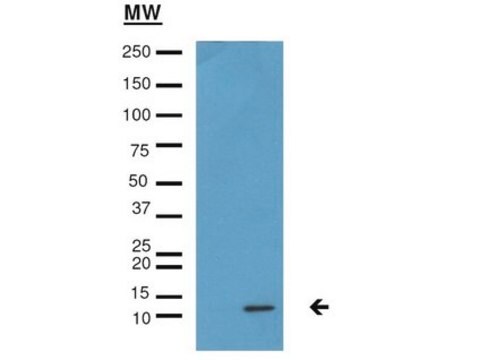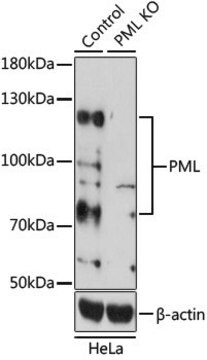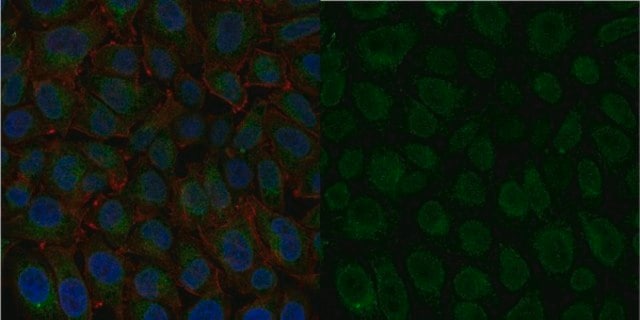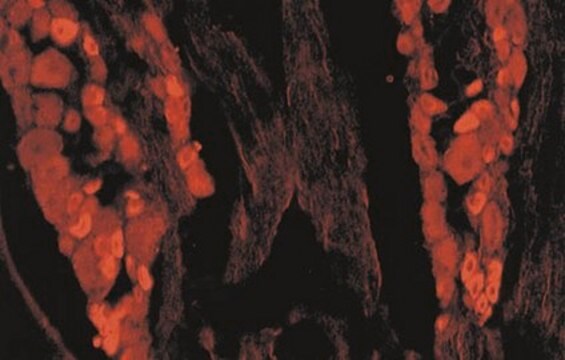07-1570-S
Anti-monomethyl Histone H4 (Lys20) Antibody, Trial Size
Upstate®, from rabbit
Synonyme(s) :
H4K20me1, Histone H4 (monomethyl K20), H4 histone family, member A, Histone 1, H4a, Histone cluster 1, H4a
About This Item
Produits recommandés
Source biologique
rabbit
Niveau de qualité
Forme d'anticorps
affinity isolated antibody
Type de produit anticorps
primary antibodies
Clone
polyclonal
Produit purifié par
affinity chromatography
Espèces réactives
human
Fabricant/nom de marque
Upstate®
Technique(s)
ChIP: suitable
dot blot: suitable
inhibition assay: suitable (peptide)
western blot: suitable
Numéro d'accès NCBI
Numéro d'accès UniProt
Conditions d'expédition
wet ice
Modification post-traductionnelle de la cible
monomethylation (Lys20)
Informations sur le gène
human ... H4C1(8359)
Description générale
Spécificité
(Lys20), Mr 11 kDa.
Immunogène
(AKRHR[me1K]VLRD-C) of human Histone H4.
Application
Sonicated chromatin prepared from HeLa cells (2 X 106 cell equivalents per IP) was subjected to chromatin immunoprecipitation using 4 μg of either a negative control antibody or Anti-Monomethyl-Histone H4
(Lys20) antibody and the Magna ChIP A Kit (Cat. #17-610). Successful immunoprecipitation of monomethyl-histone H4 (Lys20)-associated DNA fragments was verified by qPCR using GAPDH coding region ChIP Primers versus Control Primers corresponding to the GAPDH promoter.
Please refer to the EZ-Magna ChIP A (Cat. # 17-408) or EZ-ChIP (Cat. # 17-371) protocol for experimental details.
Dot Blot Analysis : Absurance Histone H3 Antibody Specificity Array (Cat. No. 16-667) and Absurance Histone H2A, H2B, H4 Antibody Specificity Array (Cat. No. 16-665), which contain histone peptides with various modifications were probed with Cat. No. 07-1570-S Anti-monomethyl Histone H4 (Lys20) at 1:1000 dilution. Proteins were visualized using a Donkey anti-rabbit IgG conjugated to HRP and a chemiluminescence detection system.
Western Blot Analysis:
0.1 μg/mL of proteins were visualized using a goat anti-rabbit secondary antibody conjugated to HRP and a chemiluminescence detection system (Please see figures)
Peptide Blocking Assay:
40 μg of histone H4 peptide containing monomethyl Lys20 abolished detection of histone H4 by anti-monomethyl-Histone H4 (Lys20) in immunoblot analysis of acid extracts of HeLa cells (Please see figures).
Epigenetics & Nuclear Function
Chromatin Biology
Histones
Qualité
Description de la cible
Forme physique
Stockage et stabilité
Handling Recommendations: Upon receipt, and prior to removing the cap, centrifuge the vial and gently mix the solution. Aliquot into microcentrifuge tubes and store at -20°C. Avoid repeated freeze/thaw cycles, which may damage IgG and affect product performance.
Remarque sur l'analyse
HeLa cell acid extracts.
Informations légales
Clause de non-responsabilité
Not finding the right product?
Try our Outil de sélection de produits.
Code de la classe de stockage
12 - Non Combustible Liquids
Classe de danger pour l'eau (WGK)
WGK 1
Point d'éclair (°F)
Not applicable
Point d'éclair (°C)
Not applicable
Certificats d'analyse (COA)
Recherchez un Certificats d'analyse (COA) en saisissant le numéro de lot du produit. Les numéros de lot figurent sur l'étiquette du produit après les mots "Lot" ou "Batch".
Déjà en possession de ce produit ?
Retrouvez la documentation relative aux produits que vous avez récemment achetés dans la Bibliothèque de documents.
Notre équipe de scientifiques dispose d'une expérience dans tous les secteurs de la recherche, notamment en sciences de la vie, science des matériaux, synthèse chimique, chromatographie, analyse et dans de nombreux autres domaines..
Contacter notre Service technique






